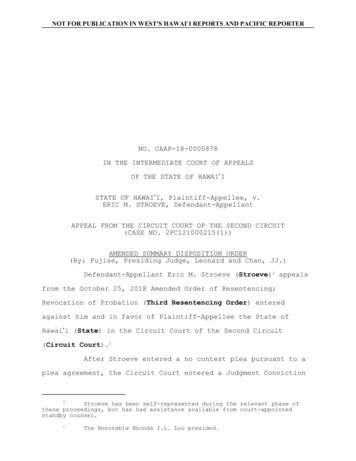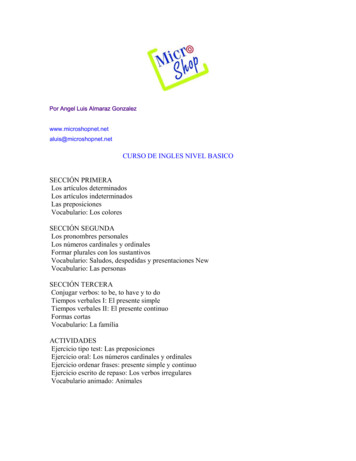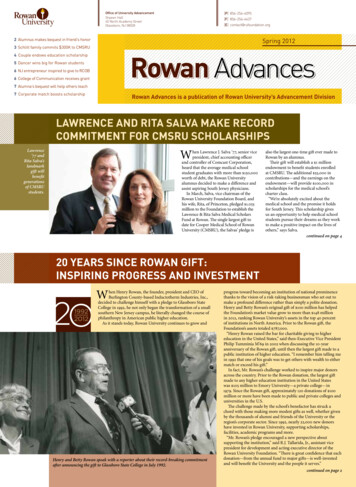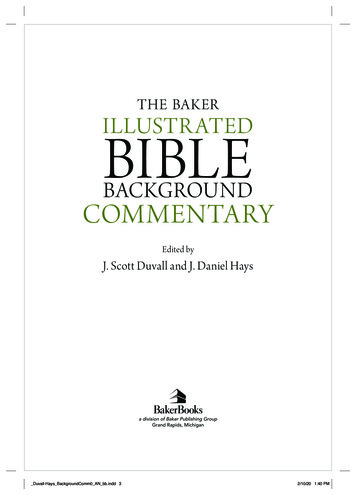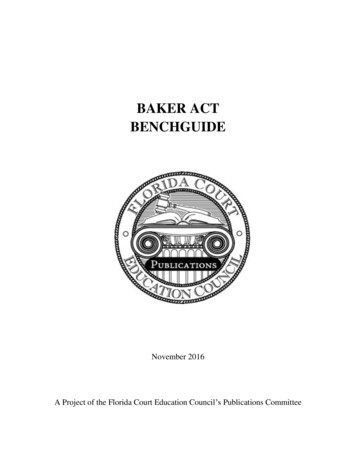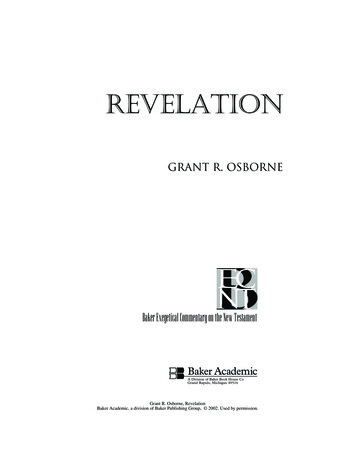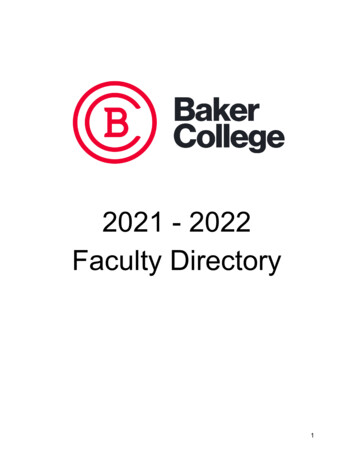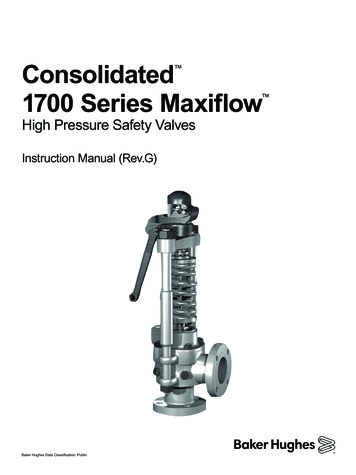
Transcription
OTKCABA Resentencing Guidefor the Fair and JustSentencing Reform Act(SB 1393) and PC § 1170(d)(1)TRCOU
Table of ContentsIntroductionThe Success of the Fair and Just Sentencing Reform Act in 20183Glossary of Key Terms 6FAQs - SB 1393 - The Fair and Just Sentencing Reform Act8How Does SB 1393 Impact Me?Pre-Sentence 10Sentence on Appeal 11Final Sentence 12Overview of Penal Code § 1170(d)(1) ResentencingWhat is Recall of Sentence and Resentencing?13What does the 1170(d)(1) Resentencing law say?14How long has PC § 1170(d)(1) existed.?15Is PC § 1170(d)(1) Resentencing mandatory or discretionary?15Is there a Petition for PC § 1170(d)(1) Resentencing?15Do I need a lawyer to request PC § 1170(d)(1) Resentencing?16What are the eligibility criteria for PC § 1170(d)(1).?17Who is currently being recommended for PC § 1170(d)(1).?18How do I request a review for resentencing.?23What will happen at the PC § 1170(d)(1) . hearings?27Will I be represented by an attorney for my Recall and Resentencing?29Will I go Out to Court (“OTC”) for resentencing.?30What can I do to prepare for Recall and Resentencing?31If the court decides . not to resentence me, can I appeal the decision?32If I took a plea agreement, will it impact my resentencing?32Next Steps 34Contacts List 35Resource List 37Appendix 38
IntroductionThe Success of the Fair and Just Sentencing Reform Act in 2018California has some of the most severe sentence enhancements in the nation. According to thePublic Policy Institute of California (PPIC), California has more than 100 separate code sectionsthat add years to a person’s prison or jail sentence. As of 2016, one of the most commonly usedsentence enhancements was the “nickel prior,” a 5-year enhancement for serious prior felonies.Californians face close to 100,000 additional years of incarceration because of this 5-yearsentence enhancement.In 2018, Ella Baker Center staff, members, interns, and allies lobbied in Sacramento and acrossCalifornia, meeting with elected officials to discuss the importance of proposed bills impactingCalifornia’s sentencing laws, including Senate Bill 1393.SB 1393, authored by Senators Holly Mitchell (Los Angeles) and Ricardo Lara (Long Beach),and signed into law by Governor Brown, allows judges to strike (or not impose) a 5-yearenhancement for a prior serious felony.Also known as the Fair and Just Sentencing Reform Act, SB 1393 helps restore balance in thejudicial process, address extreme sentences, and reduce racial disparities in the criminal justicesystem by allowing judges to decide what is best in the interest of justice. The passage of thisbill builds on the growing momentum in California to enact criminal justice reforms that divestfrom ineffective mass incarceration policies and invest in community-based solutions like mentalhealthcare, education, and substance-use treatment.There is more information about SB 1393 and the other policy and community organizing effortsof the Ella Baker Center for Human Rights on our website at www.ellabakercenter.org.ELLA BAKER CENTER FOR HUMAN RIGHTS3
What is the purpose of this Toolkit?This Toolkit is informational and does not provide legal advice specific toyour case.This Toolkit does not constitute legal advice and does not establish an attorney-clientrelationship. We suggest finding the sections that are most relevant to your case anddetermining whether the steps provided would be safe and worthwhile to take for yourself andyour loved ones. We recommend that you consult any attorneys working on your case or yourparole hearing before asking a District Attorney to refer you for resentencing.We created this Toolkit for people with 5-year sentence enhancementsfor prior felonies and their loved ones. This Toolkit also provides generalinformation on Recall and Resentencing (Penal Code § 1170(d)(1)).This SB 1393 and PC § 1170(d)(1) Resentencing Toolkit is designed to be both a specific and ageneral resource. Specifically, this Toolkit provides information for people serving sentenceswho have 5-year enhancements for prior serious felony convictions. It is now possible torequest resentencing on the basis of these enhancements because of the passage of SB 1393(effective January 1, 2019). We also hope that this Toolkit’s overview of PC § 1170(d)(1) Recalland Resentencing law and processes will be helpful for people seeking information aboutresentencing in other contexts. This Toolkit contains information that applies to people who areawaiting sentencing or already sentenced under California state laws. This includes people whoare currently serving time in either state or county custody. There is information that appliesboth to people who are currently on appeal and also to people whose sentence is “final.”The information in this Toolkit is subject to change, and we hope you shareyour experiences with us so we can improve it over time.The information in this Toolkit may not be a current, accurate, or complete description of thisarea of the law at the time you are reading it. We are basing the information in this Toolkit on thebest of our understanding given conversations with CDCR, BPH, advocates and family memberson the inside and outside, as well as people who have been recently resentenced and released.We expect that the legal processes described in this Toolkit will continue to change as:ELLA BAKER CENTER FOR HUMAN RIGHTS4
CDCR holds Public Comment for updating Title 15 regulations for PC § 1170(d)(1) Governor Gavin Newsom’s office shapes the direction of PC § 1170(d)(1) Resentencing Courts formalize their approach to these resentencing referrals and proceedings District Attorney’s offices come on board and establish their own policies and criteria Sheriffs and the Board of Parole Hearings decide whether to make referrals Various amendments to laws and/or ballot propositions come into playWe encourage you to share this guide with your loved ones and your networks. We rely uponthe insights and experience of people inside as well as their support networks on the outside toimprove this Toolkit over time. This Toolkit will be updated as we learn more about how peopleare being resentenced and as new agency referrals and court processes take shape.Your loved ones and support network can also reach out to info@ellabakercenter.org withquestions or comments. Please send us your feedback on this Toolkit and your experiences with5-year sentence enhancements and the PC § 1170(d)(1) resentencing process to:Ella Baker Center for Human Rights1419 34th Ave, Suite 202, Oakland, CA 94601We would like to acknowledgeOur Family on the Inside, people who are currently incarcerated, people who have recentlyreturned home, our family and loved ones on the outside who make up lifesaving supportnetworks, and the advocates and community groups who work tirelessly to improve the lives ofour loved ones while they are incarcerated and to bring them home to us.Editors and Peer Reviewers including Hillary Blout, Taylor Boutelle, Aswan Boudreaux, IsabellaBorgeson, Adamu Chan, Jeremy Chan, Emile DeWeaver, Kayla Gordon, Joe Hancock, EmilyHarris, Caitlin Kelly Henry, Veronica Hernandez, Johanna Hill, Amber-Rose Howard, Forrest LeeJones, James King, Colby Lenz, Mikell Leyba, Robin Lipetzky, Ash Lynette, Juan Meza, DerickMorgan, Zakiya Prince, Rahsaan Thomas, Linda Thomason, Frida Ramirez, Ana Xayavong, andChristina Winters. A special thanks to the principal author of this toolkit, Elliot Hosman.Co-sponsors of the Fair and Just Sentencing Reform Act including ACLU of California,California Coalition for Women Prisoners, Californians United for a Responsible Budget,Coalition for Humane Immigrant Rights of Los Angeles, Drug Policy Alliance, Ella Baker Centerfor Human Rights, Friends Committee on Legislation of California, Legal Services for Prisonerswith Children, Pillars of the Community, Tides Advocacy, and Women’s Foundation of California- Women’s Policy Institute: Glenn Backes, Lizzie Buchen, Sabina Crocette, Emily Harris, EricHenderson, Eunisses Hernandez, Amber-Rose Howard, Jess Jollett, Jim Lindburg, RomarilynRalston, Christopher Sanchez, and Kathryn Snyder.Authors of the Fair and Just Sentencing Reform Act including Senator Mitchell, BridgetKolakosky, Alan Moore, and Senator Lara; Principal Coauthor: Assemblymember Kalra; andCoauthors: Senators Beall and Bradford, and Assemblymembers Carrillo, Jones-Sawyer, Quirk,Skinner, and Weber.Designers Sabiha Basrai, Emma Li, Terence Long, Norma Orozco, and Design Action Collective.This Toolkit was created by Ella Baker Center for Human Rights 2019, and may not be altered,reproduced, or used for commercial purposes without express written permission.ELLA BAKER CENTER FOR HUMAN RIGHTS5
Glossary of Key Terms§ or §§ - a legal symbol meaning “section,” or when used twice “sections,” referring tothe numbering of a specific law or regulation.AB 1618 - a 2019 California Assembly bill (Jones-Sawyer) that would made “HarrisWaivers” (see below) void as against public policy and unenforceable. The bill wassigned into law on October 8, 2019 and goes into effect on January 1, 2020.AB 1812 - a California Assembly bill sponsored by the Committee on Budget thatamended PC § 1170(d)(1) to provide CDCR with funding to make resentencing referralsand to advise judges to consider evidence of rehabilitation and post-conviction factors.The law went into effect upon Governor Brown’s signature on June 27, 2018.AB 2942 - a California Assembly bill sponsored by Assemblymember Ting thatamended PC § 1170(d)(1) and authorized district attorneys to make referrals for recalland resentencing. Co-sponsors of AB 2942 included the Sentence Review Project (ofthe organization For The People) and the Santa Clara District Attorney’s Office. Thelaw went into effect on January 1, 2019.BPH - Board of Parole Hearings, a body of CDCR that decides people’s suitability forrelease and parole supervision.CDCR - California’s prison agency, the California Department of Corrections andRehabilitation.Cohort - CDCR’s term for a group of people eligible for resentencing referrals (PC §1170(d)(1)).DA - the “District Attorney” or prosecutor in a county, either referring to individualstaff members or the office as a whole.CDC Form 22 and 602 (“602s”) - CDCR administrative appeals to address variousgrievances at the facility level all the way up to Sacramento. These appeals must beexhausted before an issue can be addressed in a civil lawsuit in court.Final Sentence - when someone with a criminal conviction has “exhausted” allof their appeals at each court level, meaning they either obtained or were deniedsome measure of relief, OR the deadlines to file appeals have passed, their sentencebecomes “final.”(Writ of) Habeas Corpus - a civil petition filed by a person who is incarceratedagainst the facility’s warden (or another custodian) asking the court to determinewhether their detention is lawful. There is typically no time limit on the filing of a writof habeas corpus.Harris Waiver - language in a plea bargain that generally forfeits a defendant’s rightto resentencing and other benefits of future policy reforms, initiatives, appellatedecisions, and changes in law. These waivers are rendered void by AB 1618.ELLA BAKER CENTER FOR HUMAN RIGHTS6
Nickel Prior - a 5-year sentence enhancement (PC § 667.5) for each prior seriousfelony which is no longer mandatory, as of January 1, 2019, with the passage of SB1393.Penal Code - the official publication of California’s laws regarding crimes, sentencing,and related matters; abbreviated as “PC,” “P.C.,” or “CPC” depending on the context.PC § 1170(d)(1) Resentencing - a way to get back into court to be sentencedanew upon the referral of a court (within 120 days of sentencing) or a governmentagency (at any time by CDCR, BPH, the District Attorney, or the Sheriff). You may hearCalifornia Penal Code section 1170(d)(1) referred to by a variety of shorthands andlegal terms, including: “1170” (note that § 1170 is a large section of the Penal Code dealing with arange of sentencing considerations), “1170(d)” (as it was originally enumerated in the Penal Code in the 1960s; notethat there are now subsections (1) and (2), and 1170(d)(2) is a different processthat only applies to people convicted under the age of 18), “recall and resentencing”, “sentence recall”, “sentence review”, and withinCDCR internally: “RRRP” (the Recall and Resentencing Referral Program).Post-Conviction Factors - events and accomplishments during incarceration thatspeak to preparedness for release and current risk to public safety. These can includeevidence of rehabilitation and in-custody conduct, such as: laudatory chronos andcertificates, disciplinary actions including RVRs and SHU terms, programming andleadership roles, volunteering, educational accomplishments including classes takenand degrees, housing assignment, work assignment and supervisor reports, age,amount of time already served in # of years and as a % of total sentence, medicalcondition and necessary accommodations, and other events and accomplishments.Pro Se (or Pro Per) - representing oneself in a criminal or post-conviction proceedingwithout the assistance of an attorney.RVR (or “115”) - a “Rules Violation Report” or disciplinary write-up for a range ofalleged in-custody conduct including not standing for count, failure to report for aducat (prison pass that allows movement within prison), or refusing a drug test. AnRVR results in an investigation, a hearing, and potential discipline. Serious RVRs areoften cited by BPH to argue against someone’s parole suitability or by CDCR to denysomeone discretionary relief such as PC § 1170(d)(1) resentencing referrals.SB 1393 - a California Senate bill sponsored by Senators Mitchell and Lara ending themandatory requirement that judges add a 5-year sentence enhancement for each priorserious felony on a person’s record. The law went into effect on January 1, 2019.SB 136 - a California Senate bill sponsored by Senator Wiener ending the mandatoryrequirement that judges add a 1-year sentence enhancement for most prior felonyprison or jail terms. The law goes into effect on January 1, 2020.Title 15 Regulations - CDCR’s administrative rules which outline the agency’s policiesand practices and which are subject to Public Comment periods prior to enactment.ELLA BAKER CENTER FOR HUMAN RIGHTS7
FAQsSB 1393 - The Fair and Just Sentencing Reform ActWhat is SB 1393?SB 1393 is a California Senate bill signed into law by Governor Brown on September 2018. Alsoknown as the Fair and Just Sentencing Reform Act of 2018, the bill was co-authored by StateSenators Holly Mitchell (Los Angeles) and Ricardo Lara (Long Beach). The law went into effecton January 1st, 2019.SB 1393 ends the mandatory requirement that judges add a 5-year sentence enhancement foreach prior serious felony on a person’s record. This 5-year enhancement is also referred to as a“nickel prior.” SB 1393 amends Penal Code sections 667 and 1385 making it optional for judgesto give a 5-year enhancement for each prior serious felony (PC §§ 1192.7(c), 1192.8, and 667.5(c))conviction.Does SB 1393 apply to all sentence enhancements?No. SB 1393 is specific to 5-year enhancements for prior serious felonies. However, in 2017, twolaws were signed that affect gun enhancements and drug enhancements:SB 620 (Bradford) ends the mandatory application of gun (or firearm) enhancements under PC§§ 12022.5 and 12022.53.SB 180 (Mitchell) repeals the three-year enhancement for prior drug-related felonies (Healthand Safety Code § 11370.2), with the exception of prior convictions involving a minor (§ 11380).Ella Baker Center for Human Rights along with the team behind SB 1393 successfully passed SB136 (Wiener), a reintroduction of SB 1392 (Mitchell), legislation that eliminates the mandatory1-year enhancement for prior felonies that resulted in a prison or jail term (PC § 667.5). The billwas signed into law by Governor Newsom on October 8, 2019, and goes into effect on January1, 2020. Ella Baker Center will be advocating with CDCR to create a new cohort for resentencingreferrals for people with these 1-year enhancements.The process for resentencing for other enhancements may be similar to what is described forSB 1393 in this document. As of October 2019, CDCR is actively considering people with SB620 gun enhancements for resentencing referrals. We anticipate additional legislative reform onother sentence enhancements in the future which would likely require similar paths to relief asoutlined in this Toolkit.Is SB 1393 retroactive?No, SB 1393 is not retroactive and did not create a right to resentencing for all people with5-year sentence enhancements for prior serious felonies.However, CDCR is currently in the process of reviewing all people in-custody with these 5-yearenhancements for potential referrals for recall and resentencing via PC section 1170(d)(1).Even though SB 1393 is not retroactive, this Toolkit will discuss various ways to prepare and selfadvocate to get 5-year prior serious felony enhancements removed if they were already appliedto your sentence. You can read about these options in How Does SB 1393 Impact Me? below.ELLA BAKER CENTER FOR HUMAN RIGHTS8
What paperwork do I need to file with CDCR to be considered for aresentencing referral?Technically, none. The Office of Legal Affairs for CDCR is working with the Office of Research toidentify all individuals currently serving time in California with 5-year sentence enhancementsfor a prior serious felony. CDCR’s Classifications Services Unit and Case Records will process thelist of individuals eligible for Penal Code section 1170(d)(1) discretionary relief. Individual packetswill then be drafted so that the CDCR Secretary can consider each candidate. We expect thata significant factor CDCR staff will consider will be involvement in rehabilitation programs, andnegative factors will likely include disciplinary history, specifically any major rules violations orsolitary confinement terms in the last five years, and whether someone has a parole eligibility orrelease date within 18 months. Anyone the CDCR Secretary recommends for resentencing shouldreceive necessary paperwork, and CDCR will also notify the court, district attorney, and publicdefender in the county of conviction.CDCR staff have told defense attorneys and advocacy organizations that it can be helpful forpeople to inform both Sacramento and the counselor assigned to them at their facility if theyare eligible for resentencing on the basis of having one or more 5-year sentence enhancements.For more information about self-advocacy see How Does SB 1393 Impact Me? and Overview ofPenal Code § 1170(d)(1) Resentencing.What is the timeline for resentencing consideration by the CDCR Secretary?The timeline for receiving a resentencing referral for previously applied 5-year enhancementsis currently unknown. SB 1393 went into effect on January 1, 2019. In June 2019, CDCR beganwriting referral letters to ask trial court judges to bring people back to court and use their newjudicial discretion to consider removing 5-year sentence enhancements for prior serious felonies.According to CDCR, there are a large number of people who need to be reviewed.What happens if someone is recommended for resentencing?A resentencing recommendation does not guarantee a lesser sentence. The trial court judge hasbroad discretion on whether or how to act on a recommendation letter from CDCR. The judgewill decide whether or not to set a hearing to examine the matter. CDCR should send the referralletter to the county’s Public Defender office, if there is one, otherwise the court will appoint anattorney from a pro bono bar panel. At the resentencing hearing, the judge will decide whetheror not to recall and resentence. If the judge decides to resentence, credit must be given fortime served and no additional time can be added to the sentence. For more information onresentencing, see Overview of Penal Code § 1170(d)(1) Resentencing.Are people who accepted a plea bargain eligible for resentencing of their5-year enhancements?Yes. The resentencing law that CDCR is using to refer people back to court is Penal Codesection 1170(d)(1). This law clearly states that people who accepted plea bargains are eligiblefor resentencing. That being said, some courts are still denying relief on the basis of the originalsentence being the result of a plea bargain.ELLA BAKER CENTER FOR HUMAN RIGHTS9
How Does SB 1393Impact Me?If you have any 5-year enhancements on your current sentencefor prior serious felonies, you may be able to use the Fair andJust Sentencing Reform Act to obtain resentencing. This sectionwill walk through various paths of self-advocacy that you and yoursupport network can pursue to remove 5-year enhancements.You do not need to pay an attorney to request review for resentencing. If you are alreadyworking with an attorney on criminal proceedings, appeals, habeas petitions, or in preparationfor the parole board, you can discuss these advocacy strategies with your lawyer or reach out tothe public defender’s office to see if any would interfere or work against other aspects of yourcase.How to best use SB 1393 depends on where you are in the sentencing process. We will explaineach of these stages in detail in the following pages. The different stages of sentencing include:Pre-SentencePeople who are pretrial or awaiting sentencing, whether in custody or releasedout on bail or their own recognizance. Because of SB 1393, the judge in yourcase now has discretion (as of January 1, 2019) whether or not to apply 5-yearenhancements for each of your prior serious felonies.Sentence On AppealPeople whose cases are active on appeal (or the deadline for appealing theirsentence hasn’t yet passed). If you were sentenced prior to January 1, 2019and you are still fighting your conviction or your sentence on appeal, you canaddress the issue of the 5-year enhancements on your sentence now that theyare no longer mandatory after the passage of SB 1393.Final SentencePeople serving time for a sentence that is “final” (no more appeals). If youhave already been sentenced and your sentence is final, you can use SB 1393as a qualifying “change in circumstances” to request a review from one of theagencies who are authorized by law to recommend you for the discretionaryrecall and resentencing process in Penal Code section 1170(d)(1).Pre-Sentence: I have not yet been sentenced in a Californiacriminal case. I am pretrial awaiting sentencing either in custodyor released out on bail or my own recognizance.Effective January 1, 2019, SB 1393 amended PC sections 667 and 1385 to make it optional for thejudge to impose 5-year sentence enhancements for prior serious felony terms.Option 1The judge deciding your case now has discretion whether or not to apply 5-year enhancementsfor any prior serious felonies when sentencing you. Your attorney can argue that 5-yearELLA BAKER CENTER FOR HUMAN RIGHTS10
enhancements should not be applied to your case under the “interests of justice” standard. The“interests of justice” standard is not clearly defined in the law, but judges tend to look at postconviction factors, and should be referencing the factors laid out in PC section 1170(d)(1) suchas behavior in-custody, record of rehabilitation, and reduced risk to public safety. Your attorneycan point to various facts in terms of your case, your activities while incarcerated pretrial or in aprevious term, aspects of your life experience, and your role in your family and support networkto show why you shouldn’t be further punished by these discretionary enhancements.Option 2If you are considering taking a plea agreement, your attorney should fight to exclude anywaivers of your right to resentencing from the terms of your plea agreement. This will be helpfuldown the road so that you can request resentencing on another basis. For more information onplea agreements and resentencing waivers, go to the “If I took a plea agreement, will it impactmy resentencing?” sub-section of the Overview of Penal Code § 1170(d)(1) Resentencing.Is My Sentence “Final”?For state felony convictions in California, you typically have 60 daysafter your trial court judgment to file for an appeal with the CaliforniaCourt of Appeal; the Court of Appeal’s decision becomes “final” after30 days, after which you have 10 days to file for an appeal with theCalifornia Supreme Court; after the California Supreme Court eitherrenders its decision or refuses to take up the appeal, you have 90 daysto file for review (to request a “writ of certiorari”) from the United StatesSupreme Court.To determine if your sentence is “final” or if you have passed thedeadlines for appealing your sentence or conviction, please speak toyour attorney and/or request the Retroactivity-Finality Cheat Sheet bythe First District Appellate Project in the Resource List.Sentence on Appeal: My sentence isn’t final because I am still onappeal, or deadlines haven’t yet passed for me to file appeals.If you were sentenced prior to January 1, 2019 and you are still fighting your conviction or yoursentence on appeal, you can address the issue of any 5-year enhancements on your sentencenow that they are no longer mandatory after the passage of SB 1393.Option 1If you are currently appealing your conviction, you should ask your attorney to argue that theappellate judge should remand (send) your case back to the trial court judge so that theycan exercise their new discretion under SB 1393 to remove or strike any 5-year enhancementsapplied to your sentence. This will be based on the fact that the California Supreme Courtapplies the benefits of new laws to cases under appellate review per the doctrine of “EstradaRetroactivity” (see In re Estrada (1965) 63 Cal.2d 740). The principle of Estrada Retroactivityholds that recent policy reforms should be applied to your case if you are still on appeal andaspects of your sentence are now discretionary (optional) instead of mandatory.Option 2If you have exhausted your California appeals but the period to file for review with the UnitedStates Supreme Court is still running, you or your attorney can still file a writ of habeas corpus,ELLA BAKER CENTER FOR HUMAN RIGHTS11
or your attorney can file a “motion to recall the remittitur,” to get your case back into statecourt. You or your attorney can argue that “Estrada Retroactivity” allows the judge to use newdiscretion to remove the 5-year enhancements from your sentence.Final Sentence: I am serving time in State Prison for a sentencethat is final, meaning I have no more appeals or I have passed thedeadlines to file my state or federal appeals.After you have “exhausted” all of your appeals, or passed the deadlines to file these appeals,your sentence becomes “final.” If you were already sentenced with at least one 5-yearenhancement and your conviction is final, you may be able to take advantage of the recentpassage of SB 1393 and the newly amended PC section 1170(d)(1) to be “resentenced” in the“interests of justice.” You can use SB 1393 as a qualifying “change in circumstances” to request areview from agencies who are authorized by law to recommend you for the discretionary recallof sentence and resentencing process.In order to get back to court for resentencing, you will need either CDCR, BPH, or the DistrictAttorney to send a letter to the court recommending you for resentencing. This recommendationletter will give the trial court back the authority and discretion to resentence you, which thecourt lost 120 days after your sentencing. The court will then decide whether or not to schedulea hearing. If a hearing is set, the judge may use their discretion to recall your sentence and set aresentencing hearing. At the resentencing hearing, the judge may use their discretion to removeany 5-year enhancements from your sentence.For more in-depth information on all of the options below, refer to theOverview of Recall and Resentencing (PC § 1170(d)(1)) section.Option 1Ask CDCR to recommend you for resentencing. This can look like an informal or formal request(Form 602) informing your counselor that you are eligible for CDCR’s 5-year Prior SeriousFelony Enhancement “cohort.” You can also send a letter to CDCR in Sacramento informingthem of your eligibility. You can also advocate for yourself with facility staff who may be willingto initiate the request for you to be considered in CDCR’s internal evaluation process. CDCRreferrals are ultimately decided by the Secretary in Sacramento.Option 2Ask the District Attorney’s office to recommend you for resentencing. This can look like:writing a letter to the DA informing them of your record of rehabilitation and requesting areferral for resentencing; working with the Public Defender or the attorney who argued yourcase at trial to ask the DA about a referral; and/or asking the Sentence Review Project, cosponsor of AB 2942, who are assisting DA offices to create process and criteria for making PCsection 1170(d)(1) referrals. Always exercise caution when approaching District Attorneys, asanything you say can be used against you in other proceedings or at parole hearings.Option 3You can request that the Board of Parole Hearings recommend you for resentencing. Howeverthe Board of Parole Hearings is currently deferring to CDCR to make resentencing referrals.Option 4In other proceedings, such as a SB 1437 Felony Murder Resentencing hearing, your attorney canadvocate with CDCR staff and/or the District Attorney to make a PC section 1170(d)(1) referral.ELLA BAKER CENTER FOR HUMAN RIGHTS12
Overview of Penal Code§ 1170(d)(1) ResentencingWhat is Recall of Sentence and Resentencing?California Penal Code (“PC”) section 1170(d)(1) gives four law enforcement agencies the powerto refer someone who is currently incarce
the organization For The People) and the Santa Clara District Attorney's Office. The law went into effect on January 1, 2019. BPH - Board of Parole Hearings, a body of CDCR that decides people's suitability for release and parole supervision. CDCR-California's prison agency, the California Department of Corrections and Rehabilitation.


